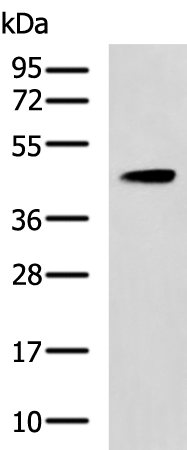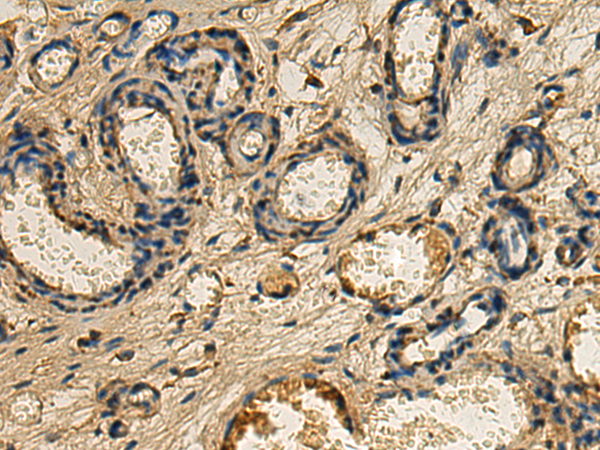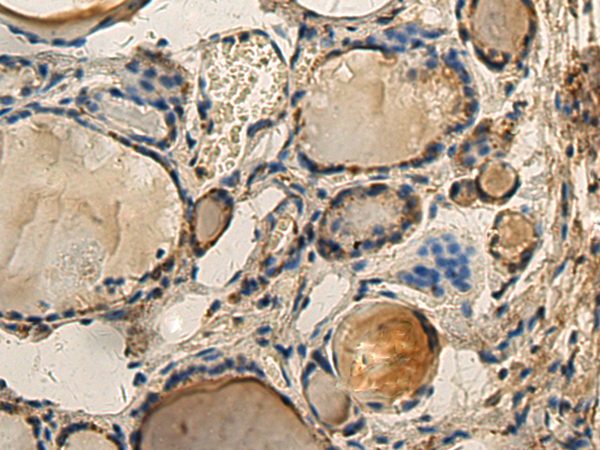


| WB | 咨询技术 | Human,Mouse,Rat |
| IF | 咨询技术 | Human,Mouse,Rat |
| IHC | 1/150-1/300 | Human,Mouse,Rat |
| ICC | 技术咨询 | Human,Mouse,Rat |
| FCM | 咨询技术 | Human,Mouse,Rat |
| Elisa | 1/5000-1/10000 | Human,Mouse,Rat |
| Aliases | PP2CA; PP2Calpha; PP2C-ALPHA |
| WB Predicted band size | 42 kDa |
| Host/Isotype | Rabbit IgG |
| Antibody Type | Primary antibody |
| Storage | Store at 4°C short term. Aliquot and store at -20°C long term. Avoid freeze/thaw cycles. |
| Species Reactivity | Human, Mouse, Rat |
| Immunogen | Fusion protein of human PPM1A |
| Formulation | Purified antibody in PBS with 0.05% sodium azide and 50% glycerol. |
+ +
以下是关于PPM1A抗体的3篇参考文献(示例为模拟内容,实际文献需查阅数据库):
1. **"PPM1A regulates TGF-β signaling through dephosphorylation of Smad2/3"**
*作者:Lin et al. (2006)*
**摘要**:研究揭示了PPM1A通过去磷酸化Smad2/3蛋白负调控TGF-β信号通路,Western blot实验中采用PPM1A抗体验证其蛋白表达水平及磷酸酶活性。
2. **"PPM1A modulates p53-dependent apoptosis in cancer cells"**
*作者:Zhang et al. (2012)*
**摘要**:探讨PPM1A在p53介导的细胞凋亡中的作用,通过免疫沉淀和免疫荧光技术(使用PPM1A特异性抗体)证明其与p53的相互作用及在DNA损伤反应中的功能。
3. **"Loss of PPM1A exacerbates hepatic steatosis via AMPK signaling"**
*作者:Wang et al. (2018)*
**摘要**:研究PPM1A在代谢紊乱中的角色,发现PPM1A缺失通过AMPK通路加剧肝脏脂肪变性,实验中使用PPM1A抗体检测小鼠肝脏组织中蛋白表达变化。
如需具体文献,建议通过PubMed或Google Scholar以关键词“PPM1A antibody”或“PPM1A function”检索近期论文。
**Background of PPM1A Antibody**
PPM1A (Protein Phosphatase Mg²⁺/Mn²⁺-Dependent 1A), also known as PP2Cα, is a serine/threonine phosphatase belonging to the metal-dependent protein phosphatase (PPM) family. It plays a critical role in regulating diverse cellular processes, including stress response, cell cycle progression, and apoptosis, by dephosphorylating key signaling components. PPM1A is notably involved in modulating pathways such as the p38 MAPK cascade, TGF-β signaling, and the DNA damage response. Its activity is regulated through interactions with binding partners, post-translational modifications, and subcellular localization.
Antibodies targeting PPM1A are essential tools for studying its expression, localization, and function in both physiological and pathological contexts. These antibodies are widely used in techniques like Western blotting, immunoprecipitation, and immunohistochemistry to assess PPM1A levels in tissues or cell lines. Dysregulation of PPM1A has been implicated in diseases such as cancer, neurodegenerative disorders, and metabolic syndromes, highlighting its therapeutic relevance. For example, reduced PPM1A expression is linked to enhanced tumor growth in certain cancers, while its overexpression may suppress oncogenic signaling.
When selecting a PPM1A antibody, factors like specificity (validated via knockout controls), host species, and application compatibility are critical. Researchers often rely on commercially available monoclonal or polyclonal antibodies, which should be validated for cross-reactivity and batch consistency. Understanding PPM1A's role through antibody-based studies continues to advance insights into cellular regulation and disease mechanisms.
×